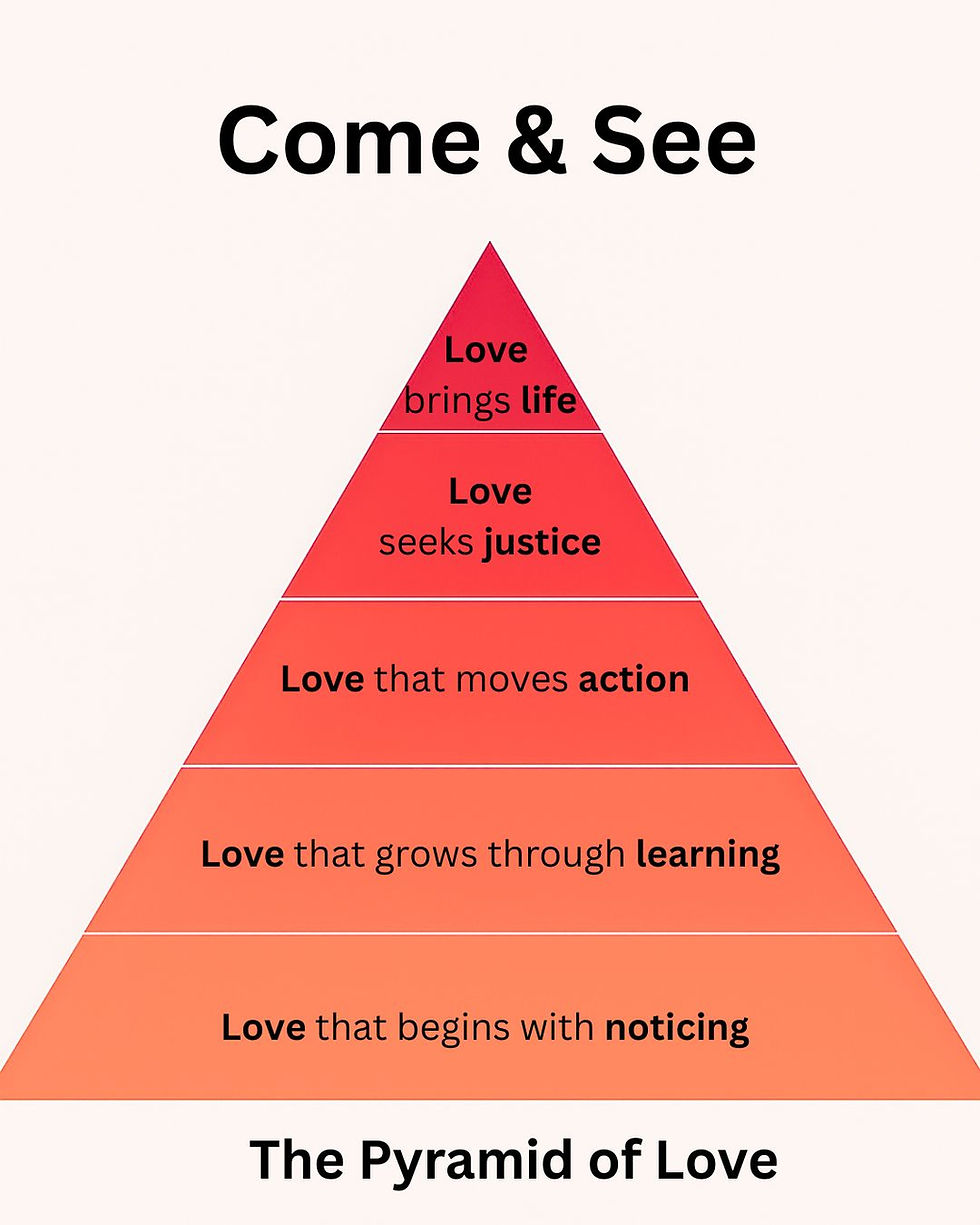God in Jesus Measures the Impact
- yikigai2021

- Feb 22, 2025
- 5 min read
Updated: Mar 2, 2025
2.23.2025
Bringing out the best in his followers
[Texts]
Genesis 45:3-11, 15
Psalm 37:1-11, 39-40
1 Corinthians 15:35-38, 42-50
Luke 6:27-38

Grace and Peace from God to you, my dear holy and beloved siblings in Christ.
Last Sunday, we reflected on the Beatitudes, which reminded us of God’s favor and grief and how Jesus’ teachings reveal God’s mercy and love for us. Next Sunday, we will conclude the season of Epiphany with the Transfiguration of Our Lord, where we hear the Heavenly Father commands us to listen to His beloved Son, Jesus. So, will we learn to listen to him today?
As we delve into Luke 6, we hear Jesus providing examples of “measuring” the impact of our relationships in the world. In verse 38, He says, “For the measure you give will be the measure you get back.”
[Context]
How can we measure the impact of our relationships that Jesus asks us to embody and the actions He asks us to take? Loving our enemies, doing good to those who hate us, blessing those who curse us, praying for those who mistreat us, and giving generously to those who exploit us.
In our ministries, we see the impact we make because of our changed attitudes and behaviors by following Jesus’ teachings. We can also record the increased percentage or number of people who participated in the transformational journey. The more people who join with changed attitudes and behaviors described in Luke 6, the greater the impact we can make, right?
On my day off last Friday, my husband and I went to see the animated movie Ne Zha 2. The character Ne Zha has always fascinated me since I was a child. According to folklore, Ne Zha's blood contains supernatural or demonic properties, contributing to his immense power and unique abilities. Because of his mischievous personality, he was unlovable to all except his parents and a few others around him. Their love for him was expressed by how they brought out the best in him.
Toward the end of the movie, Ne Zha's opponent pierces needles into his body. His mother hugged him, something she couldn’t do earlier in the movie because Ne Zha felt embarrassed in front of everyone. Despite knowing how painful it was for his mother to hug him with those needles on his body, he told his mother that he should have just died for being born a demonic being. Enduring the pain while hugging him, his mother told him that it didn’t matter whether he was immortal or a demon—he was always her beloved son.
Throughout the movie, Ne Zha fought hard against his demonic nature. By the end of the film, many others, including himself, joined the path to fight against what was not life-giving. My takeaway from their actions is that they focused on bringing out the best in each other, making the final victory possible. Because they all shared a common goal, their relationships were healed and restored.
I believe that even children can understand, after watching this movie, the concept that “for the measure you give will be the measure you get back.” However, I think the kind of measurement that Jesus refers to is deeper than having increased percentages or numbers of participants who changed their attitudes and behaviors to make the world better. Indicators/measures of our impact in numbers are important in ministries, but what keeps these indicators/measures meaningful and purposeful is more important. And we can find it in the story of Joseph.
[Challenges & Opportunities]
Much like the challenges and opportunities we face in life, Joseph's faith journey is a tale of extraordinary drama. In Genesis 45, we witness Joseph revealing himself to his long-lost brothers and weeping uncontrollably in their presence. The trials they inflicted upon him brought both blessings and woes that we heard last Sunday from Luke 6. That’s divine's grief over his brothers and divine's favor for Joseph. Though he was once hungry, poor, sorrowful, and insulted, Joseph found himself blessed by God. Conversely, his brothers, who were full, rich, happy, and admired, they found themselves facing divine disfavor.
God brought out the best in Joseph: love and forgiveness. Although he had been grieving for years, with God sharing in his pain, Joseph told his brothers, “Do not be distressed or angry with yourselves for what you did to me; for God sent me ahead of you to preserve life.” What a holy calling!
Instead of judging and condemning his brothers, Joseph takes on the call from God to preserve life. We can learn so much from this keyword “preserve.” In Genesis 45:7, the Hebrew word translated as "preserve" is "shamar" (שָׁמַר), which means "to keep, guard, watch over" - signifying the idea of protecting and ensuring the continued existence of something or someone.
As the people of faith like Joseph, we receive the same calling from God to preserve life. To integrate the concept of "preserving life" into Jesus' teachings today, it means that we are called to protect and ensure there is an environment where Jesus’ followers will keep upholding the principle of "bringing out the best in each other" and actively practice loving our enemies, doing good to those who hate us, blessing those who curse us, praying for those who mistreat us, and giving generously to those who exploit us.
What Jesus said in Luke 23:34 may help us to love and forgive better as how God helps Joseph. Being crucified on the cross, Jesus said, "Father, forgive them; for they do not know what they are doing."
It might be easier to release our own anger and frustration by judging and condemning our offenders, but we choose to listen to Jesus. It might be easier to do it alone, but we choose to do it with our faith community, the body of Christ. It also might be easier to do it just once or twice, but we choose to preserve such a holy calling. It definitely will take more than doing it a few times to make new attitudes and behaviors become part of our DNA.
Whenever we feel abandoned or exploited, we know judging and condemning won’t resolve the chaos we are in. We focus on how to bring the best part in us to live on. Also, when someone feeling abandoned or exploited comes to us for support, we commit to release and share what is preserved within us as we listen to their stories, bringing the best part in them and leaving the rest to God, who can heal and restore their souls.
[Good News]
What is the Good News of “for the measure you give will be the measure you get back”? Even though it is kind of similar to the concept of “karma” in other religions, we have God who loves us enough to die for us, powerful enough to resurrect us, and merciful enough to be always with us.
St. Paul’s in 1 Corinthians 15:53-54 discusses the transformation that believers will undergo when they are clothed with immortality through Christ. Our Savior Lord Jesus Christ is our life-giving garment! By grace through faith, God in Jesus wants to bring out the best in us, in others, in all. Always! Thanks be to God. Amen.




Comments